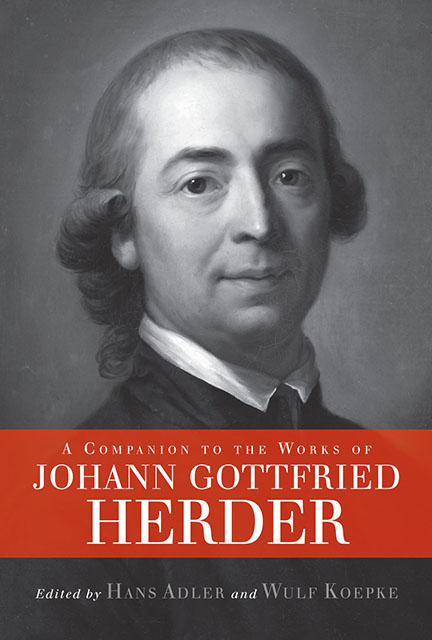Book contents
- Frontmatter
- Contents
- Acknowledgments
- List of Abbreviations
- Introduction
- 1 Herder's Life and Works
- 2 Herder's Epistemology
- 3 Herder and Historical Metanarrative: What's Philosophical about History?
- 4 Herder's Concept of Humanität
- 5 Herder and Language
- 6 Herder's Aesthetics and Poetics
- 7 Myth, Mythology, New Mythology
- 8 Particular Universals: Herder on National Literature, Popular Literature, and World Literature
- 9 Herder's Views on the Germans and Their Future Literature
- 10 Herder's Biblical Studies
- 11 Herder's Theology
- 12 Herder and Politics
- 13 Herder's Poetic Works, His Translations, and His Views on Poetry
- 14 Herder's Style
- 15 Herder as Critical Contemporary
- 16 Herder in Office: His Duties as Superintendent of Schools
- 17 Herder's Reception and Influence
- Bibliography
- Notes on the Contributors
- Index
7 - Myth, Mythology, New Mythology
Published online by Cambridge University Press: 28 February 2023
- Frontmatter
- Contents
- Acknowledgments
- List of Abbreviations
- Introduction
- 1 Herder's Life and Works
- 2 Herder's Epistemology
- 3 Herder and Historical Metanarrative: What's Philosophical about History?
- 4 Herder's Concept of Humanität
- 5 Herder and Language
- 6 Herder's Aesthetics and Poetics
- 7 Myth, Mythology, New Mythology
- 8 Particular Universals: Herder on National Literature, Popular Literature, and World Literature
- 9 Herder's Views on the Germans and Their Future Literature
- 10 Herder's Biblical Studies
- 11 Herder's Theology
- 12 Herder and Politics
- 13 Herder's Poetic Works, His Translations, and His Views on Poetry
- 14 Herder's Style
- 15 Herder as Critical Contemporary
- 16 Herder in Office: His Duties as Superintendent of Schools
- 17 Herder's Reception and Influence
- Bibliography
- Notes on the Contributors
- Index
Summary
CONTRARY TO THE WIDESPREAD prejudices that the eighteenth century, being a period of rational enlightenment, was an “extremely barren epoch for research in mythology” and that the call for New Mythology toward the end of the century signaled an anti-rational criticism of enlightenment, 2 myth plays a central role as early as in the works of Christian Wolff (1679–1754) and Alexander Gottlieb Baumgarten (1714–1762), protagonists of German Enlightenment philosophy. They represent, to a certain extent, the two traditions of the mythical mode of thinking, which can be linked, respectively, to Plato (427–347 B.C.) and Aristotle (384– 322 B.C.). In addition to the epistemological, aesthetic, and anthropological aspects dealt with by these philosophers, we must also delve into the historical and semiotic aspects unfolded, for instance, by Giambattista Vico (1668–1744), William Warburton (1698–1779), and Etienne Bonnot de Mably de Condillac (1714–1780). Herder, who was familiar with these philosophers, synthesized and transformed their teachings into highly powerful ideas — for instance, Volk, nation, and humanity — that strongly influenced the following two centuries. This essay examines these three traditions — Platonic, Aristotelian, and historical — one by one in order to show how Herder makes use of them.
In the eighteenth century, the concept of myth did not have the metaphysical and religious weight that some of the recent mythologists, such as Kurt Hübner, envisage, nor was it the term laden with psychoanalytic lore packed onto it by Sigmund Freud (1856–1939), Carl Gustav Jung (1875–1961), and others. For a long time, terminology followed the Latin tradition in the same manner as the Greek gods appeared in their Latin replicas. So, the term was not “Mythos,” or “myth,” but “Fabel,” or “fable,” which not only referred to Aesopian apologues but, according to Aristotle's use of mythos in his Poetics, to literary subject matter in general, so that the literary critic Johann Christoph Gottsched (1700–1766), for instance, defined fable as an invention that the poet could use for an apologue, a comedy, a tragedy, or an epic poem. Benjamin Hederich, on the other hand, in his Gründliches mythologisches Lexikon, cites the Greek term mythos but translates it as “Fabel,” fable.
- Type
- Chapter
- Information
- A Companion to the Works of Johann Gottfried Herder , pp. 165 - 188Publisher: Boydell & BrewerPrint publication year: 2009
- 15
- Cited by



